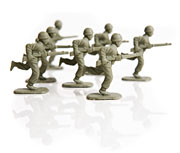The military — which tends to insist on operating in a reality-based world, as a matter of self-preservation — thinks global heating is a big threat.

A bit from the story:
Today, 11 retired senior generals issued a report drawing attention to the ability of climate change to act as a “threat multiplier” in unstable parts of the world. The Army’s former chief of staff, Gen. Gordon R. Sullivan, who is one of the authors, noted he had been “a little bit of a skeptic” when the study group began meeting in September. But after being briefed by top climate scientists and observing changes in his native New England, Sullivan said he is now convinced that global warming presents a grave challenge to the country’s military preparedness.
“The trends are not good, and if I just sat around in my former life as a soldier, if I just waited around for someone to walk in and say, ‘This is with a hundred percent certainty,’ I’d be waiting forever,” he said.
Here’s a few bits more from the story:
The U.S. military is increasingly focused on a potential national security threat: climate change.
Just last month the U.S. Army War College funded a two-day conference at the Triangle Institute for Security Studies titled “The National Security Implications of Global Climate Change.” And tomorrow, a group of 11 retired senior generals will release a report saying that global warming “presents significant national security challenges to the United States,” which it must address or face serious consequences.
…
The study’s authors, along with several other national security experts, confirmed last week that the military has begun studying possible future impacts of global warming with new intensity.
…
Commissioned by the Center for Naval Analyses, a government-funded think tank, the report boasts a list of contributors that includes eight retired four-star generals and three three-stars. Many have significant technological expertise, and some, such as Admiral T. Joseph Lopez, are close to Vice President Cheney. Others, including Gen. Anthony C. Zinni, have criticized President Bush in recent years.
…
Part of the sense of urgency, the generals said in interviews last week, stems from the fact that changing climatic conditions will make it harder for weak nation-states to address their citizens’ basic needs. The report notes, for example, that 40 percent of the world’s population gets at least half its drinking water from the summer melt of mountain glaciers that are rapidly disappearing.
“When a government can no longer deliver services to its people, ensure domestic order, and protect the nation’s borders from invasion, conditions are ripe for turmoil, extremism and terrorism to fill the vacuum.”
…
The military has contemplated the implications of climate change before: In 2004 it released a study of possible catastrophic global warming that was commissioned by Andrew Marshall, who directs the Pentagon’s Office of Net Assessment; four years earlier the Defense Department issued a report titled “Climate Change, Energy Efficiency and Ozone Protection.”



